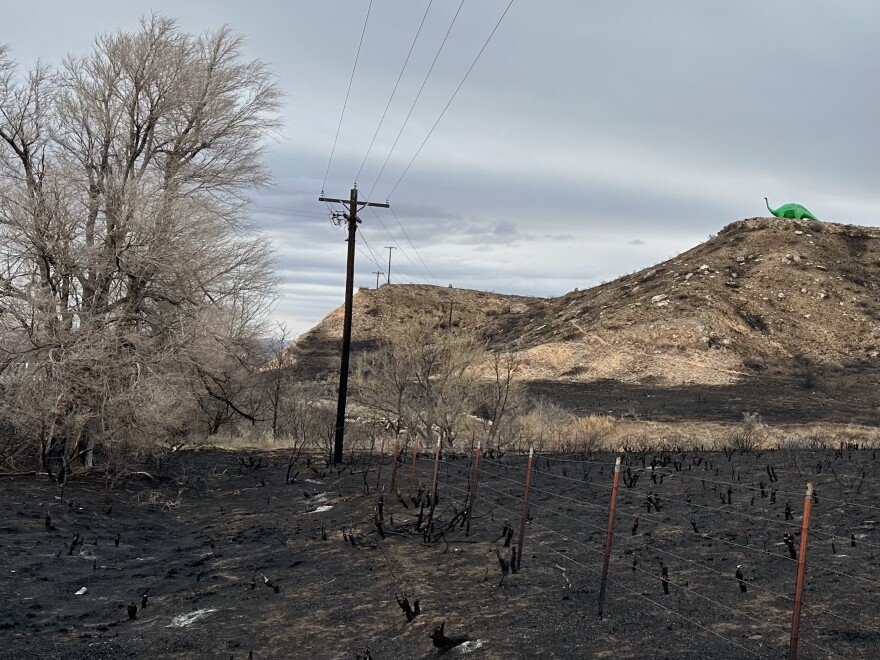The electric provider in charge of the downed power poles that sparked the largest wildfire in Texas history told Texas lawmakers on Thursday that the company is accepting responsibility — but denying negligence — for circumstances that led to the fire.
Testimony from Adrian Rodriguez, president of Xcel Energy's New Mexico and Texas Southwestern Public Service Company, came on day three of hearings held by a Texas House committee investigating the historic Panhandle fire.
Xcel had previously acknowledged its role in The Smokehouse Creek Fire, which began on Feb. 26 and destroyed homes, businesses and burned more than a million acres before it was contained in mid-March. But this week’s extensive testimony in Pampa, Texas provided a more complete picture of the fire’s origins and the extent of the damage it caused in the Panhandle.
Leaders for the Texas AgriLife Extension Service told lawmakers on Wednesday that initial estimates show the fire caused at least $102 million in losses associated with ranching, including lost livestock and damaged infrastructure.
The fire’s origins
Lawsuits filed against Xcel Energy state a vulnerable utility pole should have been removed earlier this year after it was inspected by a third-party contractor.
Kevin Pierce, investigator for the Texas A&M Forest Service, told the committee his investigation found “chop marks” at the base of several utility poles, including the one attributed to starting the Smokehouse Creek Fire. Rodriguez told committee members the chop marks found at the base of those poles were part of the inspection process from contractors, a practice known as “chipping.”
“This is an established industry practice for assessing the remaining useful life of certain wood poles,” Rodriguez said. “In some cases after inspection, the pole can be treated and reinforced, and in other cases, the pole needs to be replaced.”
Testifying on Thursday, Rodriguez maintained Xcel Energy was not negligent with the utility pole, given high winds in the Panhandle on the day it fell.
Osmose Utilities is the contractor in charge of inspecting utility poles for Xcel Energy in the region. The company was called to testify during this week’s hearings, but responded in writing and denied the committee’s request.
"Osmose is deeply concerned about the profound impact of the Panhandle Wildfires and is committed to assisting with all investigations," the company said in a statement to the Texas Tribune. "Although we were unable to attend the Committee meeting on short notice, we sent the attached letter to the Investigative Committee and offered to meet with its staff to discuss fire mitigation and recommended best practices in the State of Texas."
Rodriguez told the committee an inspection from Osmose two weeks before the fire started determined that the pole met Xcel's criteria for replacement.
He said replacements are scheduled on a rolling basis and the pole was not replaced in the weeks between Feb. 9, when Xcel Energy received the inspection information from Osmose, and when it broke on Feb. 26.
“Obviously, I wish we could turn back the clock and replace the pole that failed,” Rodriguez said. “But I cannot.”
Rodriguez also testified that an Xcel Energy line was responsible for starting another fire, the 687 Reamer Fire, that burned 2,000 acres before joining the Smokehouse Creek Fire.
Rep Dustin Burrows (R-Lubbock) asked if the damage claims being made against Xcel could lead to the company raising electricity rates. Rodriguez responded that “it’s possible” but that, for now, the company is still assessing the claims.
The Windy Deuce Fire
The Windy Deuce Fire was the second largest of the late February Panhandle wildfires. It burned more than 140,000 acres and almost reached the Pantex nuclear facility property. Texas A&M Forest Service investigators determined that fire was also caused by a downed utility pole.
However, Rodriguez testified Thursday that Xcel Energy was not responsible for the line at the point where the Windy Deuce Fire started.
“This is a circumstance where Xcel owns a line up to the meter or the point of delivery and the customer owns all facilities behind that point,” Rodriguez said. “We are aware of a bankruptcy court filing by a customer, an oil and gas company, where the company notes that it has received claims from third parties alleging that it is responsible for the Windy Deuce Fire.”
Committee chairman Rep. Ken King (R-Canadian) referred to previous testimony from Forest Service investigators that placed the start of the Windy Deuce Fire at damaged utility lines on an oil pump site.
“He shows a multitude of pictures of a well site. In fact, he even referenced an old lease sign that was by a company named Polaris,” King said. “His report on the ignition site was very clear where this started, and it was trees rubbing on an electric line on an oil field location that was the ignition site per Texas Forest Service. I mean, that was the ignition site.”
Rep. Burrows was presented with a bankruptcy filing from Polaris Operating, LLC filed on March 8, saying “certain third parties” have alleged that Polaris Operating was responsible for downed utility lines causing the Windy Deuce Fire.
The committee on Thursday asked representatives with the Public Utility Commission of Texas why more lines were not placed underground, but PUC’s Mike Hoke told the panel it increases costs for landowners and repair time during outages.
While the committee’s intentions were purely investigative, King warned of a “pandora’s box” that could come with increasing regulations for utility companies and changing regulation processes for state agencies.
The committee is expected to provide its report on May 1.


